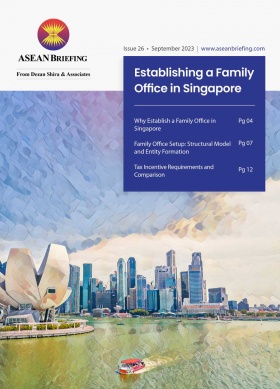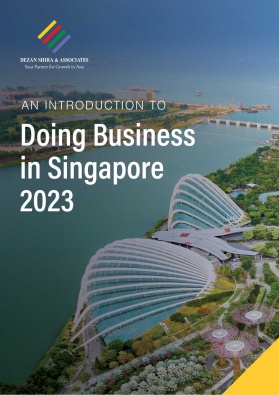Singapore Unveils Latest Relief Package to Ease Cost of Living
Singapore’s Ministry of Finance (MOF) approved an SG$1.1 billion (US$809 million) cost-of-living support package to provide more relief for Singaporean households, especially lower- to middle-income families, as well as businesses according to Finance Minister Lawrence Wong.
The package is aimed at easing the cost of living amid high inflation and builds on measures of the Budget 2023, unveiled in February of this year. The Budget 2023 included enhancements to Singapore’s Assurance Package (AP) and the permanent GST Voucher (GSTV) scheme. to help Singaporeans tide through this period of higher inflation and to cushion the impact of the GST rate increases.
The support package introduces a range of cash payments, vouchers, and subsidy schemes for Singaporean citizens and households, to be paid out at the end of 2023 and in 2024.
Inflation in Singapore
As is the case in many countries across the world, Singapore has been battling high rates of inflation since the world emerged from the COVID-19 pandemic.
According to the Monetary Authority of Singapore (MAS), the country’s central bank, core inflation in Singapore is projected to average at around 4 percent in 2023, per predictions made at the end of September. This would make the rate this year unchanged from 2022. Core inflation eased to 3.4 percent year-on-year in August this year, down from the peak of 5.5 percent in January.
Meanwhile, the Consumer Price Index (CPI) for “All Items” is expected to average at around 5 percent in 2023, down from 6.1 percent in 2022. CPI-All Items decreased to 4 percent year-on-year in August, below the H1 2023 average of 5.6 percent. It is nonetheless expected to increase slightly through the end of the year, “amid higher COE [Certificate of Entitlement] premiums and petrol pump prices”. COEs are quota licenses required to own a vehicle in Singapore.
What is included in the support package?
Enhancements to Assurance Package
The support package will include an SG$800 million (US$588 million) enhancement to the Assurance Package (AP), which will bring it to over SG$10 billion (US$7.4 billion).
The AP is a support scheme first introduced in 2020 to cushion citizens from the impact of the goods and services tax (GST) hike, which will take place in two phases in 2023 and 2024.
Under the AP, all Singaporean citizens aged 21 and above are eligible for yearly cash payments between SG$700 (US$514.7) and SG$2,200 (US$1,617.6), paid over the years from 2022 to 2026. The amount each citizen receives depends on their assessable income and property ownership.
Under the new support package, eligible Singaporean citizens aged 21 will receive an additional cash payment of either SG$150 (US$110.3) or SG$200 (US$147), depending on assessable income and property ownership (called the AP Cash Special Payment).
As this additional payment is not available to those with an annual assessable income of over S$100,000 (US$73,527) or who own more than one property, the 2023 COL Special Payment is targeted at middle and lower-income households.
The additional payment will be disbursed in December 2023 along with the existing AP cash payments, which means around 2.5 million eligible citizens will receive payments of up to SG$800 (US$588) at this time.
The 2023 Budget already announced an additional one-off cost-of-living (COL) payment of between SG$200 and SG$400 (US$294) for eligible citizens aged 21 and up (called the 2023 COL Special Payment), a continuation of a payment first introduced in 2022.
CDC vouchers
Another enhancement to the AP is a SG$200 increase in the value of the Community Development Council (CDC) vouchers available for Singaporean households in 2024. The CDC voucher scheme, which has been implemented since 2021, provides spending vouchers for all Singaporean households, which can be used on goods and services provided by:
- Participating supermarkets; and
- Participating hawker stalls and heartland merchants.
The 2022 Budget initially announced SG$200 in CDC vouchers for all households in 2023 and 2024. An additional SG$100 (US$73.5) in CDC vouchers was then announced for 2023 and 2024 (in the 2022 Cost-of-Living package and Budget 2023 respectively).
The support package has now announced an additional SG$200 in CDC vouchers for 2024, bringing the total value of CDC vouchers available next year to SG$500 (US$367.6).
The additional vouchers will be allocated equally across the two providers; that is, SG$100 can be spent at participating hawker stalls and heartland merchants, and SG$100 at participating supermarkets.
The previous SG$300 (US$220.6) in CDC vouchers will also be split equally with SG$150 allocated to each type of provider.
Households can claim the vouchers online from January 3, 2024, and must be used before the end of the year.
Additional service and conservancy charges rebate
The support package provides an additional half-month service and conservancy charges (S&CC) rebate for 950,000 Housing & Development Board (HDB) households. HDB households are households that live in so-called HDB flats, public housing provided by the HDB. As of 2023, around 80 percent of all Singaporean residents live in HDB flats, of which around 90 percent are occupant-owned.
The S&CC are monthly maintenance fees charged to residents of HDB flats. The government first introduced S&CC rebates in 2012 as part of its “Grow and Share” package. It was made a component of the permanent Goods and Services Tax Voucher (GSTV) scheme in the 2022 Budget.
In 2023, HDB households are eligible for between 1.5 and 3.5 months of S&CC rebates, depending on the size of the HDB flat.
In June 2023, it was announced that all town councils run by the People’s Action Party (PAP), constituting 15 of Singapore’s 17 town councils, will raise S&CC for all HDB residents, shops, offices, markets, and food stalls from July onward.
The additional half-month S&CC rebate provided in the support package will help to offset the impact of the higher S&CC for these households. According to the MOF, on average, the additional rebate will fully offset the S&CC increase in the first year of increases for one- to four-room HDB flats, and about 85 percent for larger HDB flats.
The additional S&CC rebate will be disbursed in January 2024 along with the existing rebates.
Additional U-Save rebates
In addition to the S&CC rebate, an additional SG$20 (US$14.7) will be provided per quarter in U-Save rebates between January 2024 and December 2025. The GSTV U-Save is a rebate provided to middle- and low-income households living in HDB flats to offset utility expenses, paid out four times a year. As with the S&CC rebate, it was first introduced in 2012.
The increase means total additional rebates will amount to SG$80 (US$58.8) per year over two years. This will be available to 950,000 HDB households.
According to the MOF, these additional U-Save rebates will help cushion the impact of the increase in carbon tax and water prices in 2024 and 2025. Specifically, over these two years, the additional U-Save rebates will, on average:
- Fully offset the increase in utility bills for one-two room flats
- Offset about 80 percent in utility bills for three-to-four room HDB flats; and
- Offset about 65 percent in utility bills for larger flats.
On average, this means three-to-four-room HDB flats will pay about SG$2 (US$1.47) more per month, and flats with five or more rooms will pay about SG$4 (US$2.94) more per month.
In late 2022, Singapore approved a bill to raise its carbon tax to SG$25 (US$18.38) per ton for greenhouse gas emissions in 2024 and 2025, and SG$45 (US$33) per ton from 2026 onward. This is up from just SG$5 (US$3.68) between 2019 and 2023.
Public transport support measures
In addition to the direct cash measures to support households, the support package also announced a subsidy to help households with the added costs of the planned public transport fare hikes.
On September 18, 2023, the Public Transport Council (PTC) announced an overall fare increase of 7 percent, which will take effect on December 23, 2023. This adjustment means that adults will pay SF$0.1 (US$0.07) to SG$0.11 (US$0.08) more per journey on Singapore’s public transport. This 7 percent hike is only a third of the maximum allowable fare hike of 22.6 percent in 2023. This means that the remaining 15.6 percent of planned fare hikes will be deferred to future fare review exercises.
To this end, the support package will provide additional subsidies of about SG$300 million in 2024 to cover the deferred fare adjustment quantum of 15.6 percent.
According to the MOF, the additional subsidy will help to “moderate the fare increase and pay for higher costs of providing public transport services due to the continued increase in energy prices in 2022, core inflation, and strong wage growth”.
Finally, the support package announced the issuance of public transport vouchers (PTVs) worth SG$50 (US$36.76) for resident households with a monthly per-person income of SG$1,600 (US$1,176) or less. These will be disbursed at the end of December 2023 and can be used to top up fare cards or buy Monthly Travel or Concession Passes.
Potential impact of the support package
The direct cash payments and vouchers provided to households could help stimulate consumer spending, which could positively affect businesses, particularly those in retail and catering, as consumers have more disposable income. The inclusion of small merchants and hawkers in the voucher scheme will help to prop up this essential segment of Singapore’s economy.
In addition, by targeting support toward lower- and middle-income families, the support package aims to address income inequality and ensure that those most affected by inflationary pressures receive the necessary assistance.
For companies, it could also help to offset the pressure on companies to increase wages to ensure employees earn a living wage.
About Us
ASEAN Briefing is produced by Dezan Shira & Associates. The firm assists foreign investors throughout Asia and maintains offices throughout ASEAN, including in Singapore, Hanoi, Ho Chi Minh City, and Da Nang in Vietnam, in addition to Jakarta, in Indonesia. We also have partner firms in Malaysia, the Philippines, and Thailand as well as our practices in China and India. Please contact us at asean@dezshira.com or visit our website at www.dezshira.com.







